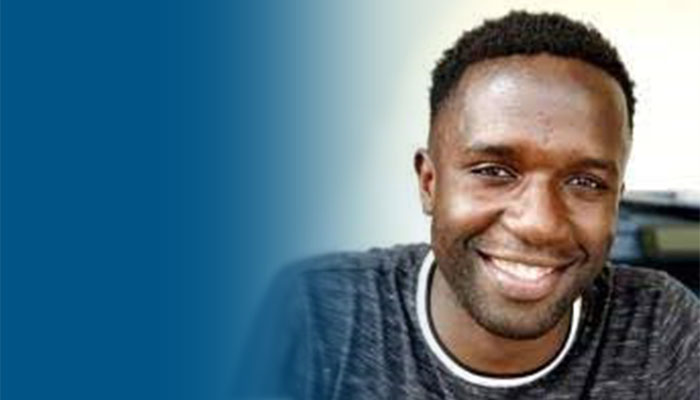HOW CAN WE HELP YOU? Call 1-800-TRY-CHOP
In This Section
Understanding Mitochondrial Adaptation: Q&A With Diversity Fellow Arnold Olali, PhD

Diversity Fellow Arnold Olali, PhD
Diversity and inclusion are critical drivers to our breakthroughs at Children's Hospital of Philadelphia Research Institute. Fostering a community of scientists from unique backgrounds and academic experiences enables collaboration to meet challenging pediatric problems from a variety of perspectives. In a Q&A series, we're featuring five new scholars in the Postdoctoral Research Fellowship for Academic Diversity program at CHOP.
As a key part of CHOP's commitment to diversity, this fellowship funds talented researchers and educators from different backgrounds, races, ethnic groups, and other diverse populations. Join us to meet these fellows, learn more about their research interests, what diversity in science means to them, and how they enjoy spending their time outside of work. Our next featured Diversity Fellow Arnold Olali, PhD, is studying how mitochondrial variants can predispose us to common diseases including cancer and increase symptom severity following viral infection.
Tell us about your background and what compelled you to apply for the Postdoctoral Research Fellowship for Academic Diversity.
I applied to the Postdoctoral Research Fellowship in Academic Diversity at CHOP because I was very excited about the work being done in the lab of Dr. Douglas Wallace, which is focused on understanding how energy metabolism affects disease risk and progression. I was excited to apply for the diversity fellowship because the goals of the program are aligned with my long-term goal to promote the success of students from underrepresented backgrounds in STEM fields.
During my junior year as an undergraduate at St. Lawrence University in Canton, NY, I decided to give research a shot. My very first research project was collecting and identifying macroinvertebrates. After completed a BS in conservation biology, I worked for a year as an intern in science policy and advocacy, followed by a full-time position in a biorepository lab.
I realized I wanted to pursue a doctorate in basic science; however, I was filled with doubts and uncertainty. To confirm my interest, I applied and was admitted to the University of Chicago Postbaccalaureate Research Education Program where I worked in a microbiology lab studying flaviviruses. I developed an interest in infectious diseases and was sure I wanted to pursue a research career.
I chose Rush University Medical Center to complete my predoctoral training and a thesis project focused on understanding HIV and combined antiretroviral therapy-induced comorbidities. Combined antiretroviral therapy (ART) significantly reduced HIV-associated death; however, ART also increased the incidence rate of a variety of commodities, including osteoporosis, the loss of bone mineral density and increased risk of bone fracture influenced by age, sex, and metabolic syndromes. Both HIV and ART are risk factors for osteoporosis, and findings showed a shift in energy metabolism as a potential mechanism driving HIV and ART-related bone loss.
What does diversity in research and science mean to you?
Diversity in research and science means differences in academic and personal background as well as demographics. Growth comes from creating an inclusive and equitable environment that is rigorous and allows people from different backgrounds to come together, challenge, and learn from one another. It is the fair treatment and equal access to opportunity and advancement and giving the stakeholders a voice in the decision-making process.
What are some research projects that you’re excited about?
I am excited about understanding how mitochondria affect overall health. The mitochondria are maternally inherited and highly variable, which allows for easy adaptation to adverse environments and energy demands. However, these variants can predispose us to common diseases, including cancer, and increase symptom severity following viral infection. The current project I am working on is focused on understanding how mitochondrial DNA variation drives the risk of developing cancer, or worsening symptoms following COVID-19 infection.
What inspired you to choose your research focus/specialty? And what do you aim to achieve with your research?
While I always have a general interest in the pursuit of knowledge, addressing scientific questions centered around specific diseases is very appealing. The mitochondria generate most of the chemical energy needed to power cellular function. I think that, combined with my previous experience, understanding changes in metabolism and mitochondrial adaptation to energy demands will equip me with the tools to study a wide variety of human diseases.
When you’re not working, do you have a favorite pastime or spot to relax, enjoy a meal, or be active?
I am a big fan of anime, so when I am not working, I like to catch up with some of my favorite shows and sometimes rewatch old ones. I played sports for most of my life, so I make time to be active, whether by going to the gym or playing in a recreational league.


